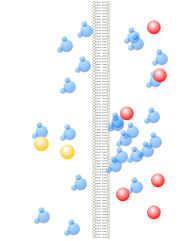TOO MUCH WATER INGESTION
Babies fed too much water can develop seizures because of a rare condition called water intoxication. Given numerous bottles of water or a very dilute baby formula to a baby under the age of 6 months can cause water intoxication. When the infant is hungry and just gulps the formula or water down, the infant's tissues swell with the excess fluid. When the serum sodium level drops, their eyes begin to flutter and a seizure occurs.
The dilution of infant formula with water can cause water intoxication in infancy. Some parents cannot afford formula and will give their babies water to drink. They baby feels satisfied after the drinking of the water and that makes the mother or caregivers think that water is enough for the hungry infant. Formulas are often diluted with water, this can also cause Kwashiorkor due to a protein deficiency. The child seems well fed because of the child's distended abdomen.
I was working as a professional nurse for many years and saw the consequences of diluted formulas or even 'mealie pap' given in a very diluted form to hungry infants.
Babies do not need extra water

Image credit
A thirsty person usually has a dry mouth, which is a consequence of the loss of extracellular water and resulting decreased flow of saliva.
Thirst is the primary regulator of water intake. "The intense feeling of thirst derives from the osmotic pressure of extracellular fluids and a thirst center in the hypothalamus of the brain. The thirst mechanism is normally triggered whenever the total body water is decreased by as little as 1%." Ricki Lewis
Too much water
If a person drinks too much water, the plasma becomes less concentrated and the osmoreceptors swell as they receive extra water by osmosis.
Nerve impulses that inhibit the thirst mechanisms are triggered when the stomach wall is distended after the drinking of water, drinking water stops long before the swallowed water is absorbed. This inhibition stops the person from drinking more than is required to replace the quantity lost, avoiding development of an imbalance of the opposite type.
Osmotic Pressure

Hypotonic hydration
- Renal insufficiency or an extraordinary amount of water ingested quickly can lead to cellular overhydration or water intoxication
- Extracellular fluid is diluted, sodium content is normal but excess water present
- Hyponatremia results and promotes osmosis into cells, causing swelling
- Nausea, vomiting, muscular cramping, cerebral edema, disorientation, convulsions, coma, and death are the results of overhydration
Sources:https://en.wikipedia.org/wiki/Kwashiorkor#/
https://sciencing.com/happens-cells-dehydrated-23904.html


Clean and uncontaminated water is needed in life.
Very good post
Thank you for sharing your information
Good luck always @ frieda
Regards
@iskandarawe
Thank you very much for your reply.
I knew water wasn't really good for babies (especially in large quantities), but I didn't understand the science behind it. My boys may have gotten 1-2 ounces of water a day, but it was later when they were 8-9 months old. Formula was always my preferred drink to give them!
When I had my children I was told to start juice and water only at six months. I never knew why but understand now!
Very useful post, also to make us ALL think about how childish and neurotic we are to be walking around with water bottles constantly. Drinking sufficient water of a HIGH quality (which is a problem in and of itself) is necessary, but we seem to be overdoing it, as if we have nothing left to worry about. Nobody dares leave the house without a bottle of water anymore - even for a walk in the park, EVEN in the chilly parts of Europe.
It's become a fad which shows up mind programming and hype over natural body-intelligence.
It is great that your article raises new awareness of possible negatives (even nonsense) to flushing or detoxing on water.
We think we are living a healthy life by over drinking water, but the only people who actually scores are the ones who supply and sell the bottled water. The average adult living in a moderate environment will take in about 2,500 milliliters of water, this varies from individual to individual. Of this amount, probably 60% is obtained from drinking water or beverages, another 30% comes from moist foods. The remaining 10% is a by-product of the oxidative metabolism of nutrients, which is called: Water Metabolism. If you take in 2,500 ml then you must eliminate 2,500 ml.
Thank you for your reply.
Next topic: bottled water and microplastics! Buying water in glass bottles is hardly convenient but might pose less of a health risk. And there's the plastic soup to consider.....
Any which way: we should be thinking much much much more seriously about our planet's waterhousehold. It begins with understanding your own. Keep pulling out such great truths #frieda!
I am thinking very hard what next. Sometimes you run out of ideas what to write about!